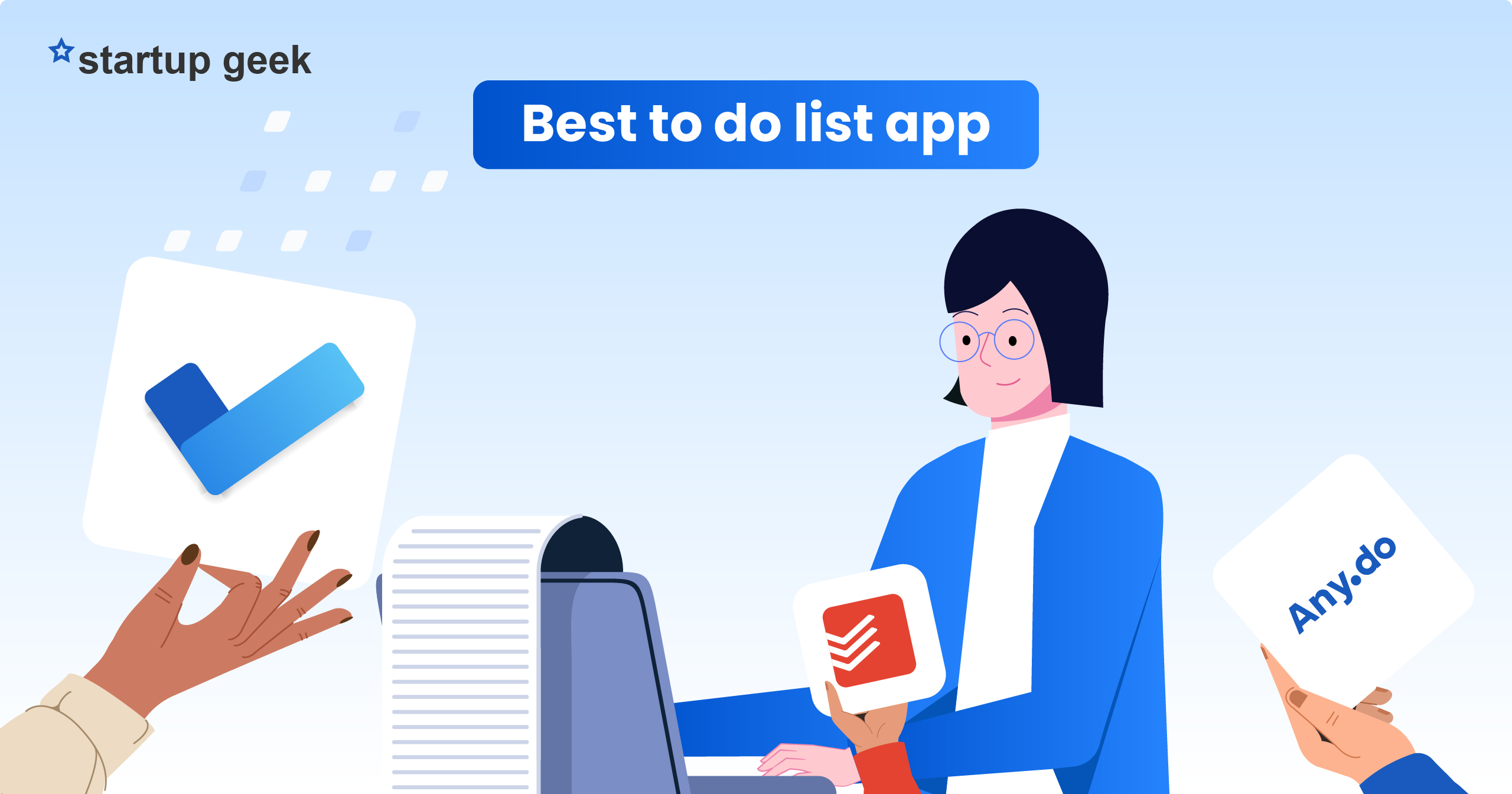To-do list apps are great, but for startup founders, these apps are more than just digital checklists; they are vital tools that help manage the relentless tide of responsibilities and deadlines. In an environment where efficiency and productivity are paramount, a well-structured to-do list app can be the difference between chaos and order.
As we step into 2024, the landscape of to-do list apps continues to evolve, offering more sophisticated features to meet the unique demands of startup founders. In this article, we’ll look at some of the best to-do list apps out there ideal for startup founders.
Features to Look for in a To-Do List App
For a startup founder or entrepreneur, an ideal to-do list app should be a powerhouse of functionality, blending essential features with advanced capabilities to handle the dynamic nature of their work. Here’s a consolidated list of features that would make a to-do list app truly invaluable for them:
1. Cross-Platform Compatibility
The app must work seamlessly across various devices and operating systems. Entrepreneurs are often on the move, switching between desktops, laptops, and mobile devices. This feature ensures they can access and manage their tasks anytime, anywhere, maintaining continuity in their workflow.
2. Task Organization and Prioritization
The app should offer sophisticated yet user-friendly ways to organize tasks. This includes color-coded priority levels, customizable categories, and the ability to easily rearrange tasks. The dynamic nature of startup life means that priorities can shift rapidly, and the app needs to accommodate this with flexibility.
3. Collaboration and Sharing Features
Given the team-oriented environment of startups, the app should facilitate easy task assignment, progress tracking, and list sharing with team members. This fosters a collaborative work culture where everyone is in sync and everyone is working towards the same set of goals.
4. Reminders and Notifications
To keep pace with a fast-moving startup environment, the app should have robust reminder and notification systems. This ensures that critical deadlines are met, and important tasks do not slip through the cracks.
5. Integration with Other Apps and Platforms
The ability to integrate with other tools such as email, calendars, project management software, and communication platforms is crucial. This integration streamlines workflows, ensuring that all information is centralized and reducing the need to switch between multiple apps.
6. Customization Options
Every startup is unique, and so are its needs. The app should offer a high degree of customization, allowing entrepreneurs to tailor it to their specific workflow and preferences. This could include custom tags, templates, or even personalized dashboard views.
The Best To-Do List Apps of 2024
1. Todoist
G2 Rating: 4.4 out of 5
Pricing: Free version; Pro $5 monthly ($4 monthly, billed yearly); Business $8 ($6 monthly, billed yearly)
Ease of use: Excels in user-friendly, cross-device task management, prioritizing simplicity and efficiency, though some users desire enhanced offline functionality and attachments.
Key Benefits: Productivity tracking, easy task entry and scheduling
Integrations: Outlook, Chrome, IFTTT, and others
Support: Available via Forum, Chat, and Email
Known for its simple, functional interface, Todoist is great for task management and team collaboration. Its intuitive design and powerful features like natural language input and recurring tasks make it a top choice.
Todoist excels as a to-do list app by balancing power with simplicity, making it highly suitable for startup founders and entrepreneurs. Its universal platform compatibility is a major plus, ensuring task management and accessibility is consistent across all devices, provided the same email address is used.
A key feature of Todoist is its natural language processing, allowing for quick task entries like “call prospects Friday,” which automatically schedules the task for the upcoming Friday.
For more advanced needs, Todoist provides custom filters, labels, and basic collaboration tools, aiding in efficient task categorization and team collaboration. The app also introduces a gamification aspect with its Karma system, rewarding task completion and feature usage with points, adding a motivational layer to productivity.
Although Todoist has a traditional structure compared to apps like Notion and Asana, it offers comprehensive integration with other apps like IFTTT, Google Calendar, and even Alexa. It also provides pre-made templates for various needs, enhancing its utility.
The free version of Todoist covers basic needs, but the Pro and Business tiers, priced at $4 monthly (when paid annually) and $6 per month ($72 per year) respectively, offer expanded features for more intensive use.
These paid versions increase project and collaborator limits and include additional features like increased personal projects, unlimited activity history, and an AI assistant among other things making Todoist perfect for professional use.
2. TickTick
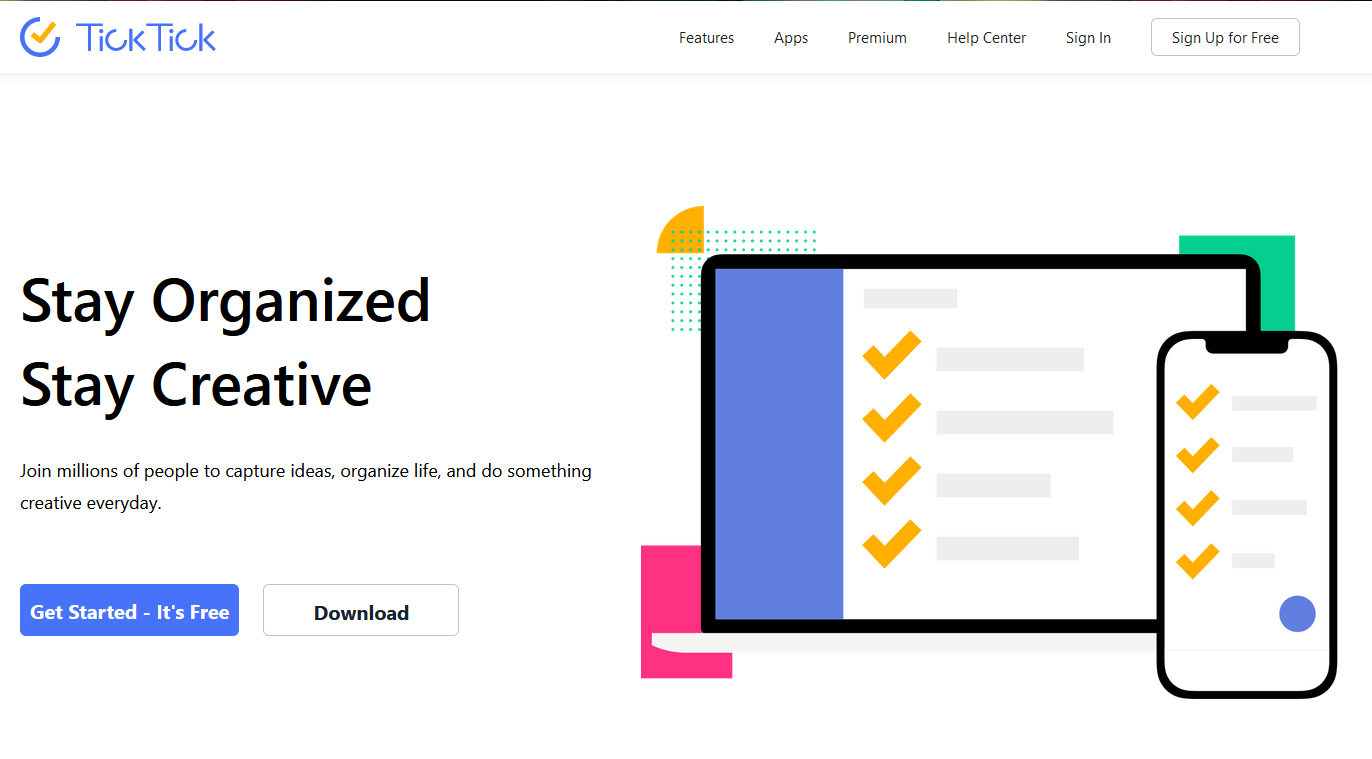
G2 Rating: 4.5 out of 5
Pricing: Free; Premium $3.99 monthly ($35.99 yearly)
Ease of Use: User-friendly interface, ensuring effortless task tracking for seamless personal management.
Key Benefits: Location reminder, Pomodoro timer, Smart date parsing
Integrations: Zapier, IFTTT, Gmail, and others
Support: Available via Forum, Chat, and Email
Tick Tick is an impressive app that stands out for its blend of task management, organizational tools, and productivity features.
Some of its standout features include voice inputs to add tasks faster, turning emails into tasks, and the option to add tasks using Siri, or Quick ball for Android phones (although the latter is a premium feature).
In the productivity department, Tick Tick has some interesting features too. There is smart date parsing which automatically parses a task into a reminder when you include the due date and time for the task, with the option to set a duration for longer tasks and create multiple reminders for one task.
You can also set reminders for tasks that occur on a regular basis – every few days or months, so that you don’t miss anything. It gets even better, Tick Tick offers a location reminder. Like the name implies, this reminder goes off once you are in a particular location.
Tick Tick does a great job of organizing tasks with features like folders, smart lists and filters, tags, sorting tasks Eisenhower-matrix style, and the good ‘ol search button to help you find tasks faster.
A big part of getting things done for a startup founder is delegation and Tick Tick helps a great deal with that. It offers impressive collaborative features that lets you share lists, assign tasks, and keep track of the task activities and the activities on an entire list.
Tick Tick also has an impressive calendar functionality for entrepreneurs who want to integrate their to-do lists with a calendar view, although users yearn for a Google Calendar integration. And to cap it off, Tick Tick helps a great deal when it comes to tackling your tasks with a combo of the Pomodoro timer and white noises to help you focus.
As regards pricing, Tick Tick has a free version with the premium version coming in at just $3.99 monthly ($2.99 if charged yearly).
3. Microsoft To Do

G2 Rating: 4.4 out of 5
Pricing: Free
Ease of use: User-friendly interface, seamlessly integrates with Microsoft products. Users desire a reporting feature, and some don’t find the note field user-friendly.
Key Benefit: Smart daily planner
Integrations: Zapier, Outlook Tasks and Calendar.
Support: Available via Forum, Chat, Phone, and Email
For those who prefer integration with Microsoft’s ecosystem, this app offers a comprehensive task management experience. It’s particularly effective for users who rely on Office 365 tools.
Its primary appeal lies in its simplicity and accessibility, making it an ideal app for those who need to manage personal schedules and basic business tasks without the complexity of more advanced to-do apps with fancier features.
One of the key advantages of Microsoft To Do is that it’s completely free. Unlike many of its competitors that offer limited free tiers with more advanced features locked behind paid plans, Microsoft To Do provides all its functionalities at no cost. This aspect is particularly appealing for startups and entrepreneurs who are mindful of their budget.
Although, if you are looking to go with the entire Microsoft ecosystem, you would have to pay to use Microsoft 365.
Adding tasks is quick and straightforward, and there’s a range of sorting options, including due date, creation date, importance, or alphabetically. And of course, there is the shareability of tasks.
Deep integration with Microsoft’s ecosystem is another feature. Tasks flagged in Outlook automatically show up in Microsoft To Do, and there’s seamless syncing with Outlook tasks, making it a perfect choice for Windows and Outlook users.
4. Google Keep
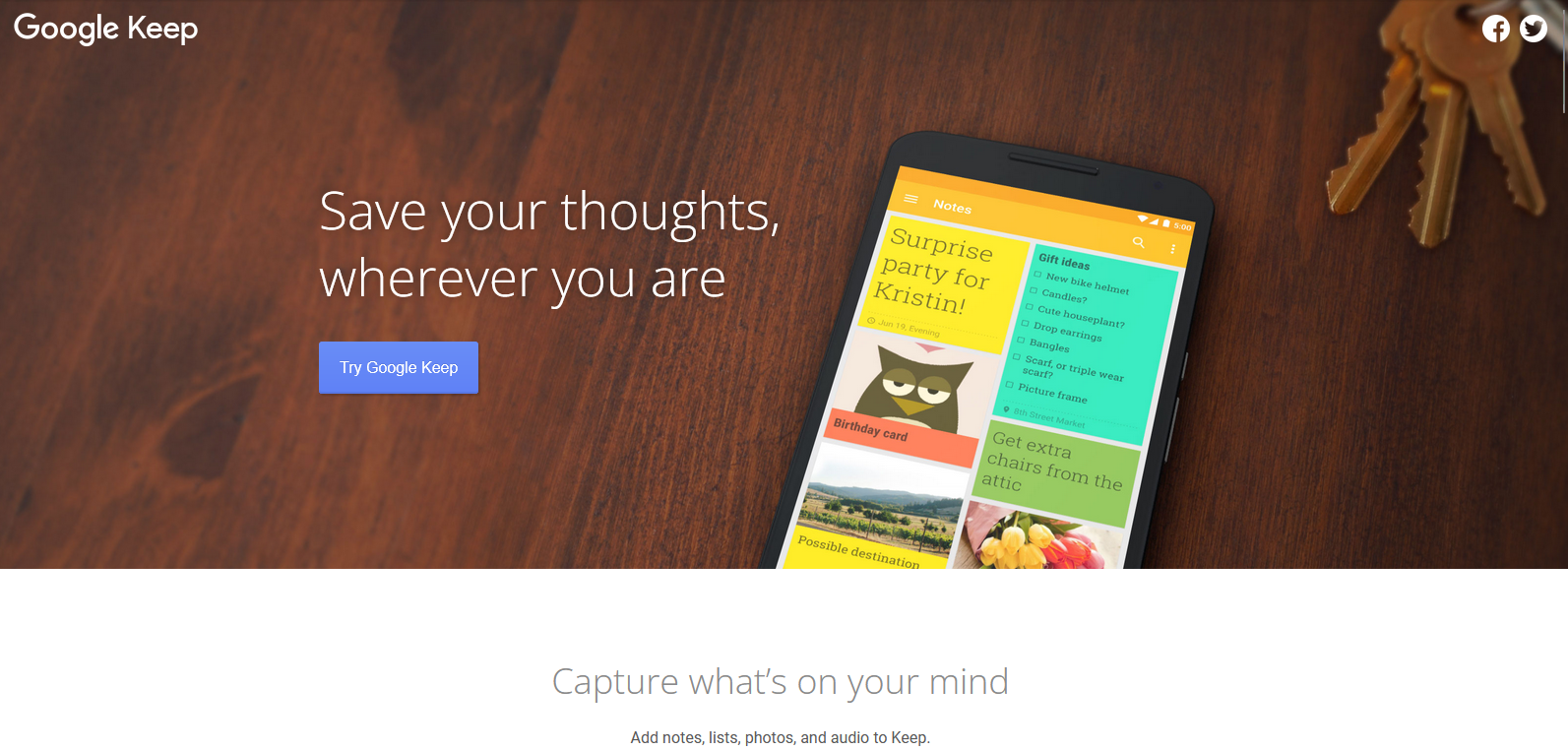
Play Store Rating: 4.3 out of 5
Pricing: Free
Ease of use: Efficient capture tool, perfect for quick checklists and reminders, but less suitable for structured content due to organizing limitations.
Key Benefits: Color coding; Version history
Integrations: Google Calendar, Zapier, and others through make.com.
Support: Available via Forum, Chat, Phone, and Email
Google Keep has evolved into one of the best daily to-do list apps, especially for those entrenched in the Google ecosystem. Its simplicity is its charm, offering the nuts and bolts of note-taking and task management without overwhelming users with excessive features.
Google Keep’s strength lies in its straightforward functionality. It excels as a tool for setting reminders, making notes, and organizing personal information while adding a collaborative dimension to the app.
One of the app’s appealing aspects is its ability to color-code notes and pin important ones for easy access. This feature enhances organization and prioritization, making it simple to identify and retrieve key information. Google Keep also excels in handling web content, such as saving articles with headlines and key images, avoiding the clutter of numerous URLs.
For those who prefer a more structured approach, Google Keep offers a traditional checklist layout for to-do lists, complete with a collapsible list of completed tasks and the option to set specific alarms for reminders. These notifications are accessible on both phone and PC, ensuring you stay on top of your tasks regardless of the device you’re using.
Another fascinating feature of Google Keep is its version history. This means you can now “download a text file of previous versions of your notes or lists to see changes you’ve made over time.”
Google Keep’s integration with Gmail accounts allows for seamless syncing of notes across platforms. This means you can add and edit your notes and lists from anywhere, enhancing its utility for users who are constantly on the move.
While there is a second tool that Google has in Google Tasks, Google Keep still trumps. This is because the latter offers more versatility and creativity. While Google Tasks is minimal and focused, Google Keep provides a more dynamic experience with more customization options and features.
Google Keep is free.
5. Due
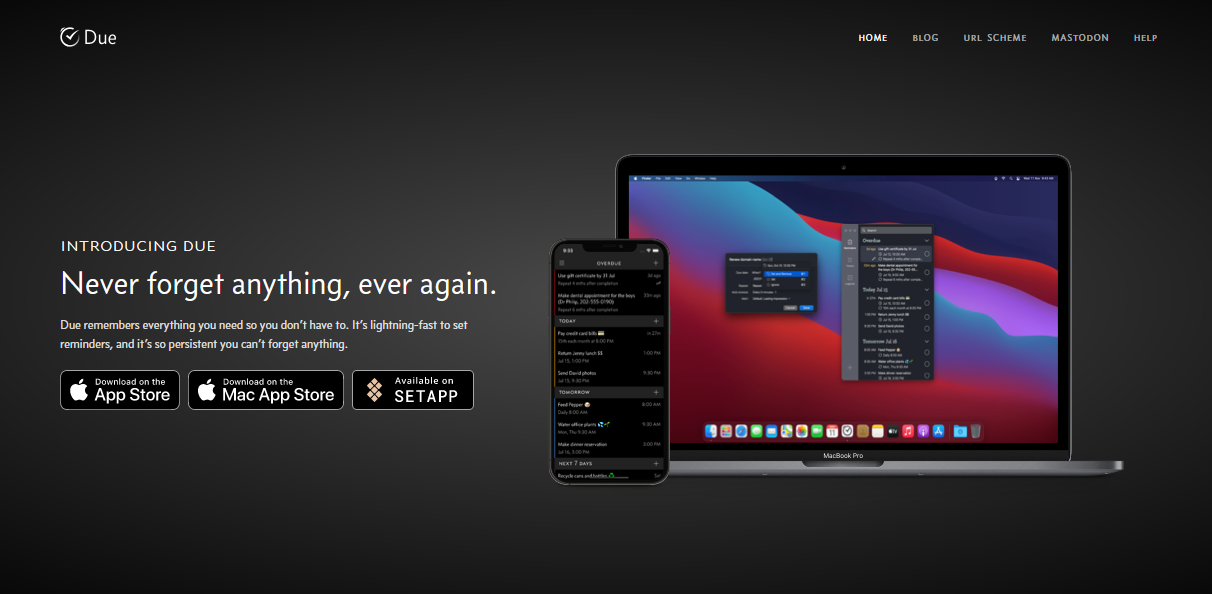
App Store Rating: 4.7 out of 5 (4.2 on Mac App Store)
Pricing: $7.99 one-time purchase for iOS (optional annual upgrade pass at $4.99); $14.99 one-time purchase for macOS (optional annual upgrade pass at $9.99)
Ease of Use: Easy to use with a simple and intuitive UI
Key Benefits: Auto Snooze, Reminders and Countdown Timers
Integrations: iCloud, Dropbox
Support: Available via Forum and Email
Due App is designed for efficient time management with its unique features like Quick Access Times for fast due date setting, and persistent Auto Snooze ensuring you never miss important reminders.
The app simplifies managing reminders directly from notifications, saving time and effort. Its Countdown Timers are ideal for repetitive tasks, and users can choose from various themes for a personalized look.
While it is a bummer that Due is primarily confined to the Apple ecosystem, the app offers seamless synchronization across devices via iCloud or Dropbox, ensuring your reminders are always updated and accessible on your iPhone, iPad, or Mac. This makes Due App a reliable and versatile choice for those needing to manage time and tasks effectively.
Due App offers a unique pricing system for its iOS (iPhone, iPad, and Apple Watch) and macOS versions. For a one-time purchase of $7.99 for iOS devices and $14.99 for Mac, users gain access to all current features and any new features released within one year of their purchase date.
Additionally, Due offers an optional Upgrade Pass subscription ($4.99 for iOS devices, and $9.99 for Mac), extending access to new features released beyond that one-year window. Importantly, any features unlocked during the subscription period remain available forever, even if the subscription is discontinued.
6. Any.do
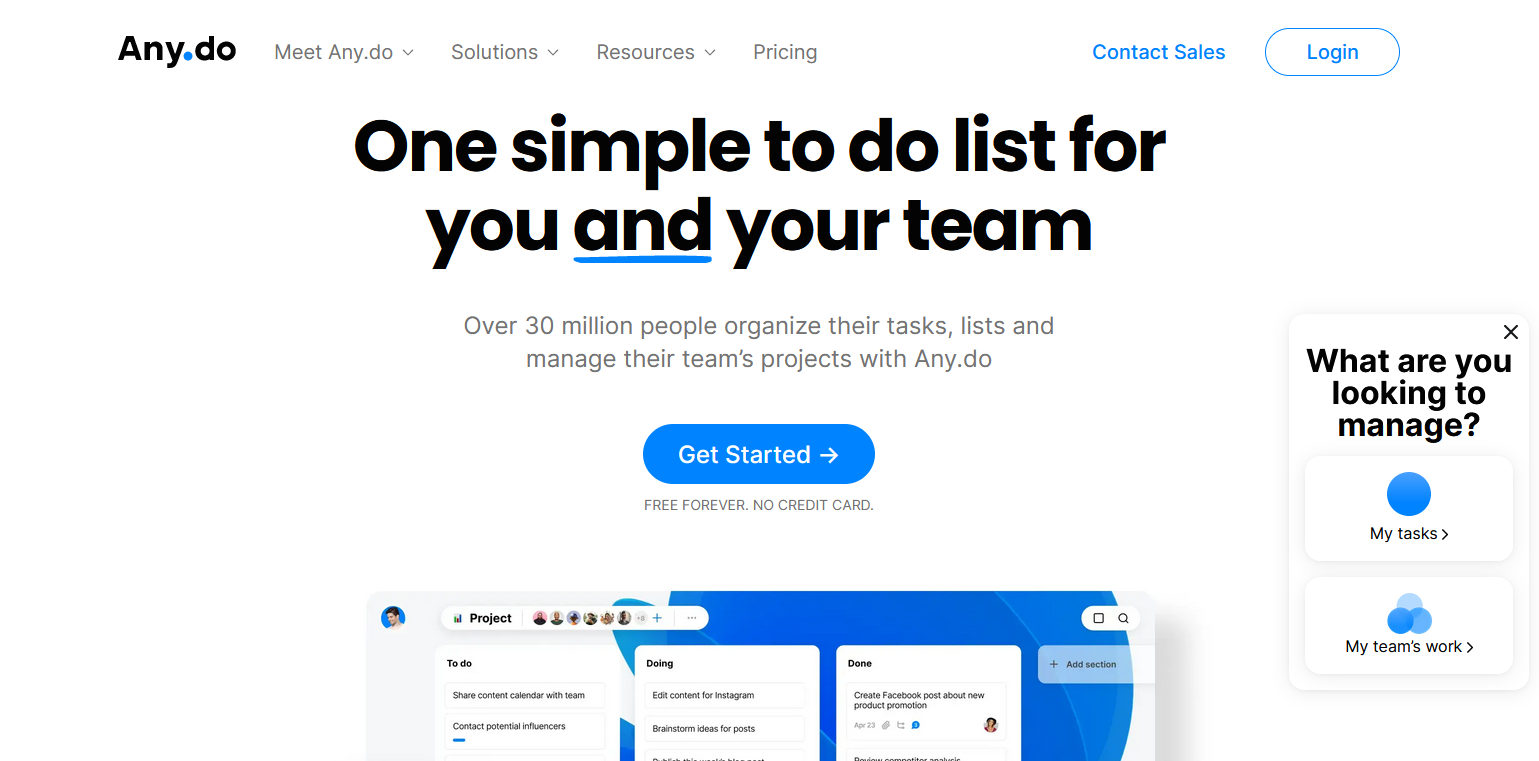
G2 Rating: 4.1 out of 5
Pricing: Free, $3 monthly premium, $5 monthly (per user) for teams
Ease of Use: User-friendly interface, effortless to use, simplifying task management.
Key Benefits: Optimized for mobile; In-built AI; “Plan my day”
Integrations: Zapier; Over 5000 apps via Zapier.
Support: Available via Forum, Chat, and Email
Any.do is a versatile task management application, offering a range of features that cater to both individual and team needs. Its mobile app is particularly noteworthy for its user-friendliness and efficiency in adding and organizing tasks.
The “Plan my Day” feature is a standout aspect of Any.do, encouraging users to schedule tasks actively rather than just listing them. This approach ensures that tasks are not only noted but also integrated into the user’s daily schedule, increasing the likelihood of completion.
The app’s user-friendly interface is a plus, although there is a learning curve for leveraging its advanced features, such as managing multiple third-party integrations. The app’s built-in AI, which suggests subtasks, further enhances its functionality, helping users break down large tasks into more manageable steps.
Any.do is not just a to-do list app; it’s a comprehensive task management tool, offering features like real-time chat, task assignment, and the ability to onboard an entire team, making it suitable for collaborative work environments.
Available across multiple platforms and languages, Any.do caters to a global user base, making it an ideal choice for businesses with international teams or operations in multilingual countries.
Any.do offers a free plan for personal use. It also has an affordable premium plan for personal use at $3 (charged annually) and $5 for teams (also charged annually).
7. MinimaList

App Store Rating: 4.7 out of 5
Pricing: Free; 0.99 monthly premium (billed $5.99 yearly)
Ease of Use: Excellent user support; praised for simplicity and cross-device accessibility
Key Benefits: Focus Timer, Cloud Syncing
Integrations: Apple Calendar; Siri
Support: Available via email
MinimaList stands out as a streamlined and efficient to-do list app, perfect for individuals who appreciate simplicity and effectiveness. Its unique features like colored lists for task prioritization and smart input for easy reminder setting enhance user experience.
The Focus Timer, inspired by the Pomodoro technique, aids in maintaining productivity, while cloud syncing ensures accessibility across iPhone, iPad, and Mac. Integrated with Apple Calendar and Siri, it offers a seamless task management experience. The app’s philosophy of “Less is More” resonates through its straightforward yet powerful design.
MinimaList offers a free version with core features. For additional premium features, users can upgrade to a Pro account at $0.99 per month or $5.99 per year. The subscription is auto-renewing, charged via iTunes, and can be managed in the Account Settings.
8. Apple Notes and Reminders
For those in the Apple ecosystem, these integrated apps provide a seamless experience for managing tasks and notes across all Apple devices.
Apple Notes
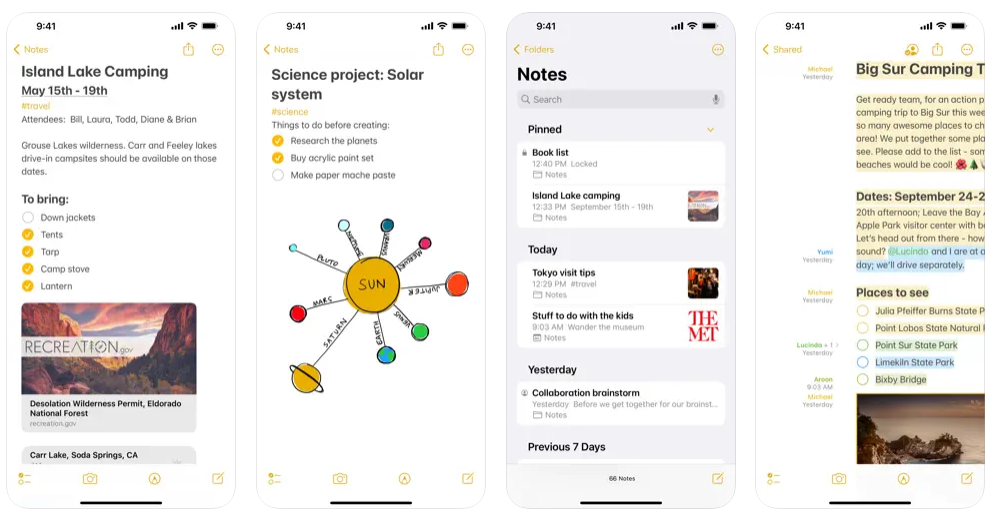
App Store Rating: 4.8 out of 5
Pricing: Free
Ease of use: Intuitive experience but lacks essential copying features, making it susceptible to accidental deletions without recovery options.
Key Benefits: Cross-platform compatibility; Note-lock
Integrations: iCloud
Support: Available via Chat and Forum.
Apple Notes is more than just a basic note-taking app; it’s a versatile tool for storing a variety of content, including checklists, articles, photos, and more. Its flexibility in note construction sets it apart from other apps.
Users can seamlessly switch between typing, using the Apple Pencil on the iPad, and adding checklists, all within the same note without altering its original structure. This flexibility is particularly useful for entrepreneurs who need to jot down ideas quickly or integrate different types of content into a single note.
Apple Reminders
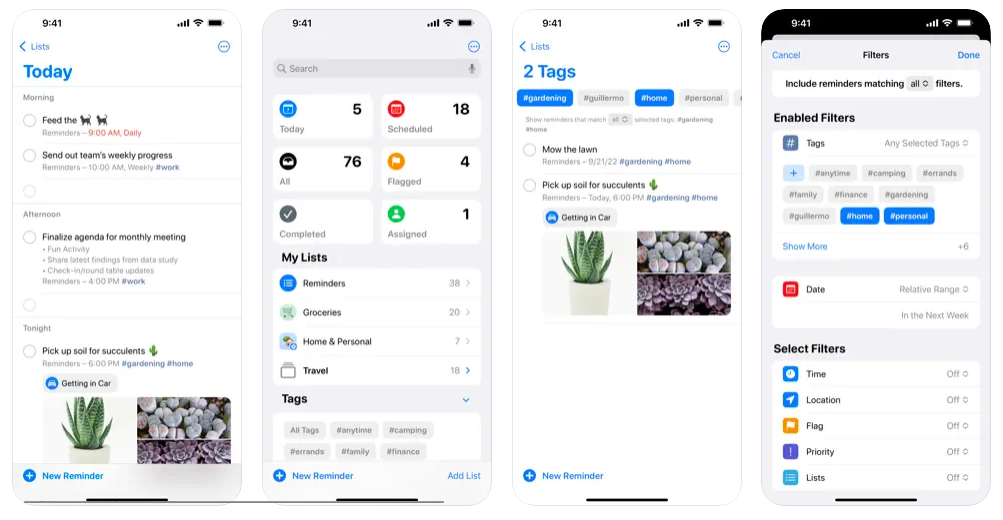
App Store Rating: 4.8 out of 5
Pricing: Free
Ease of use: Balanced user interface with useful features like customizable reminders and multiple lists. Hampers user experience with issues such as incomplete search results for completed reminders and occasional glitches affecting date resets and subtask visibility.
Key Benefits: Recurring reminders; Location reminder; Siri
Integrations: IFTTT
Support: Available via Chat and Forum.
Complementing Apple Notes is the Apple Reminders app, which serves as an efficient to-do list manager.
The app allows for reminders to be set with options to repeat daily, prioritize, and add locations. Notifications for scheduled tasks ensure that nothing gets missed, and the ability to interact with these reminders – checking off tasks, turning off alarms, or snoozing tasks – adds to its functionality.
Apple’s Notes and Reminders apps, particularly when used in tandem, offer a powerful combination for managing tasks, notes, and schedules, making them highly effective tools for startup founders and entrepreneurs within the Apple ecosystem.
This integration is particularly beneficial for startup founders and entrepreneurs who are already part of the Apple ecosystem as it offers a streamlined, synchronized experience across all their devices.
9. Omnifocus
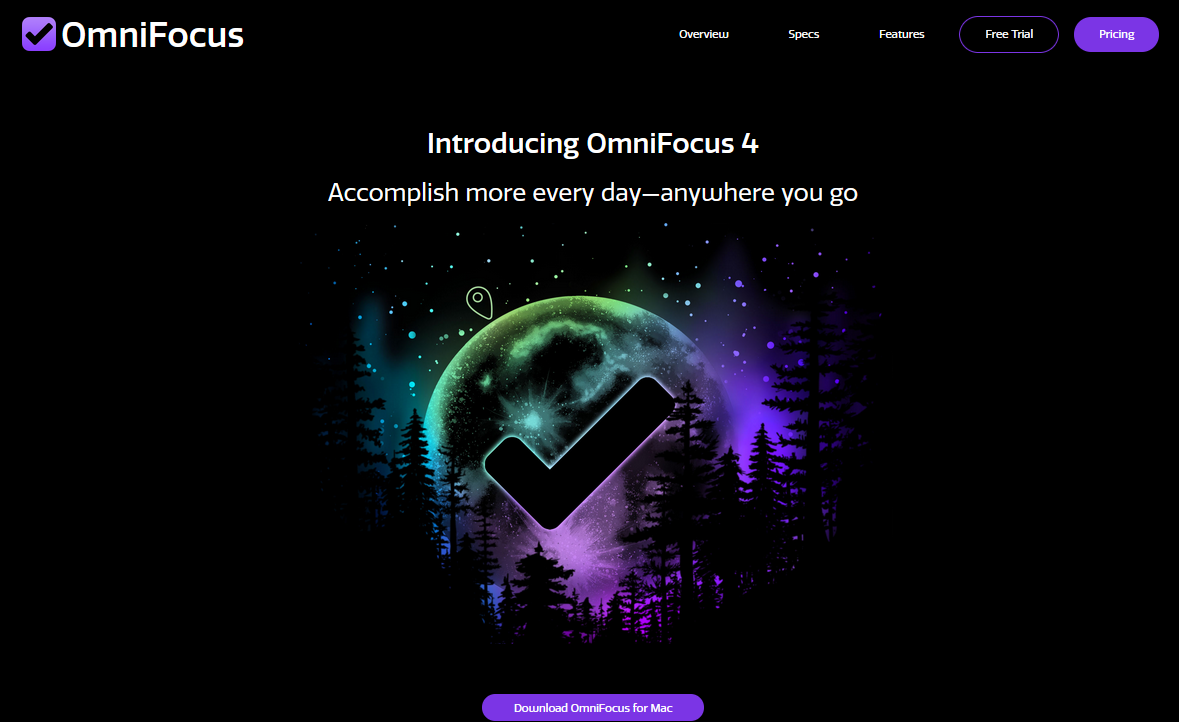
G2 Rating: 4.6 out of 5
Pricing: Free trial; $9.99 monthly; One-time payment of $74.99 for the standard license, or $149.99 for the pro license; $4.99 for the web version.
Ease of use: Flexible and fluid task management with powerful features, although the learning curve may pose challenges for some users.
Key Benefits: Tracking system; Sync across Apple devices
Integrations: IFTTT, Evernote, Notion, and others.
Support: Available via Forum, Phone, and Email
OmniFocus stands out as a sophisticated task management app, particularly tailored for those who follow the Getting Things Done (GTD) methodology, popularized by productivity consultant David Allen. This app is designed to help users achieve focus, clarity, and confidence by efficiently organizing their tasks.
The core of OmniFocus is its ability to quickly capture to-dos, effectively transferring tasks from your mind into a reliable tracking system. This feature is particularly beneficial for startup founders and entrepreneurs who often juggle multiple responsibilities and ideas.
Available for only Apple devices, OmniFocus provides seamless synchronization between desktop and mobile devices, ensuring that your task management system is always accessible.
As part of the larger Omni ecosystem, which includes apps like OmniPlan for professional project management, OmniFocus is clearly designed with business users in mind, boasting powerful tools that may be overwhelming for basic users but highly appealing for those who thrive on organization and detailed task management.
Unlike most of the apps on the list, OmniFocus does not offer a free version. Acquiring the app will set you back $9.99. Although you can make a one-time payment of $74.99 for the standard license, or $149.99 for the pro license. And if you don’t like it, you have a 30-day window to get your money back.
While OmniFocus is an excellent choice for advanced task management, its main limitation is its confinement to the Apple ecosystem, though a web version offers some workaround for non-Apple users at the price of $4.99 per month. Despite this limitation, OmniFocus remains a top-tier option for those seeking a comprehensive, professional-grade task management tool, especially within the Apple environment.
10. Habitica
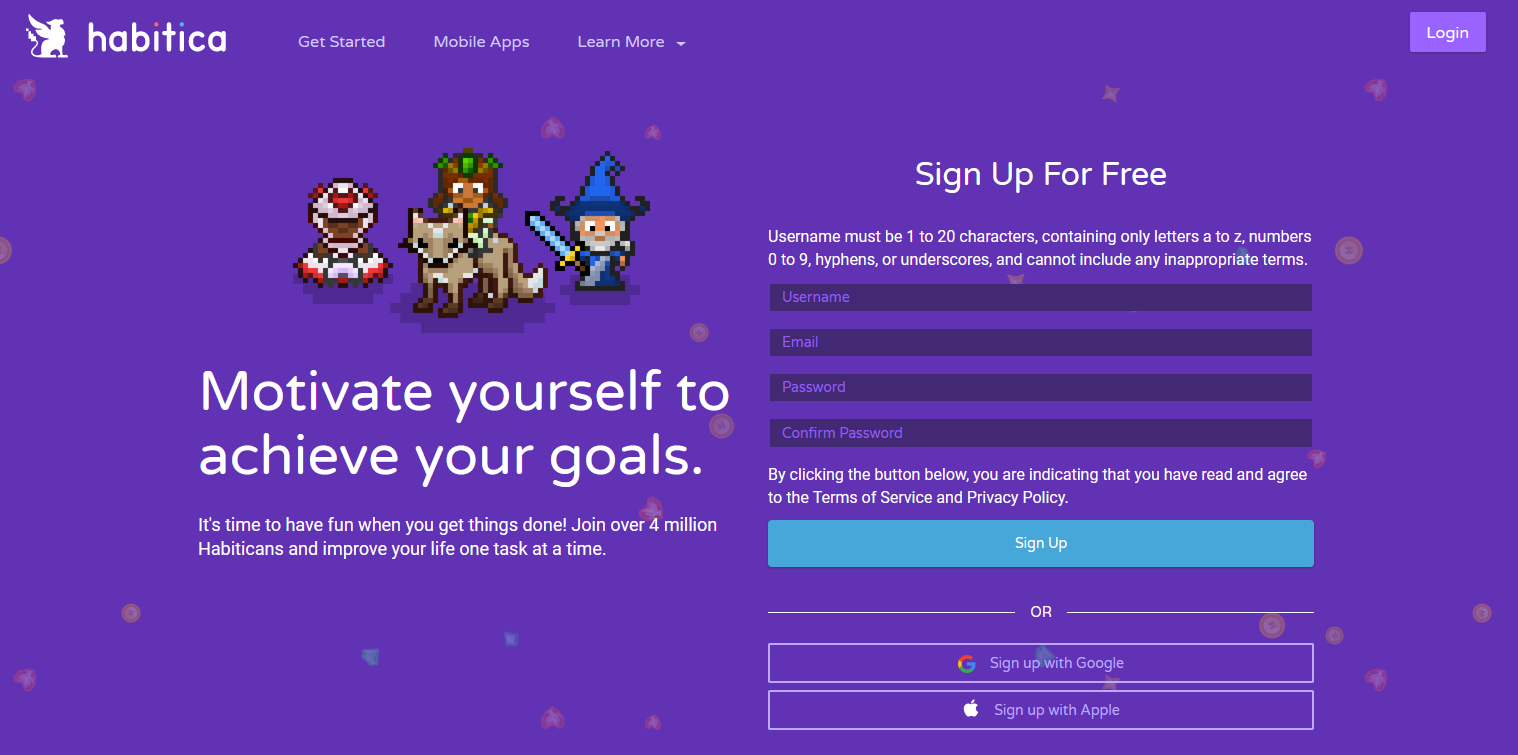
G2 Rating: 4.5 out of 5
Pricing: Free, $4.99 per month ($47.99 per year)
Ease of use: Engaging and interactive task management with a playful approach, fostering motivation through gamified elements, with minor suggestions for constant UI updates like more avatar customization options.
Key Benefits: Gamified approach; Open-source
Integrations: Zapier and other open-source integrations.
Support: Available via Forum and Email
Habitica stands out in the realm of task management apps with its unique gamified approach, transforming mundane task management into an engaging role-playing game.
This distinctive feature sets Habitica apart, particularly appealing to a niche market of users who enjoy gaming and are looking for a fun way to stay motivated. Completing tasks in Habitica isn’t just about checking off items on a list; it involves earning rewards, unlocking special armor, and discovering mysterious pets.
Habitica’s open-source nature is another unique aspect. This means any developer can contribute to its development, leading to a highly customizable app with extensive features that might not be available in other task management tools.
While Habitica’s gamified interface makes managing tasks fun and engaging, it might not be suitable for everyone. Habitica tends to resonate more with a younger demographic and may not be the ideal choice for most businesses, except for a few that are open to unconventional methods.
Available for iOS, Android, and Web platforms, Habitica provides accessibility for a wide range of mobile users, though it lacks a dedicated desktop version.
Habitica offers a free version and a premium version. However, the premium version comes with different payment plans: $4.99 per month, $14.99 every three months, $29.99 every six months, and $47.99 every year.
Conclusion and Recommendations
Choosing the best to-do list app as a founder depends on personal preferences and specific needs. For those who prefer straightforward task management, Todoist offers simplicity and efficiency, while Tick Tick provides an elegant user experience and productivity boost.
For comprehensive project planning, Any.do is ideal for its detailed collaboration features, and Due offers an auto-snooze feature so you won’t miss any taskEach app has its unique strengths, so it’s worth trying a few to see which aligns best with your workflow and enhances your productivity.
